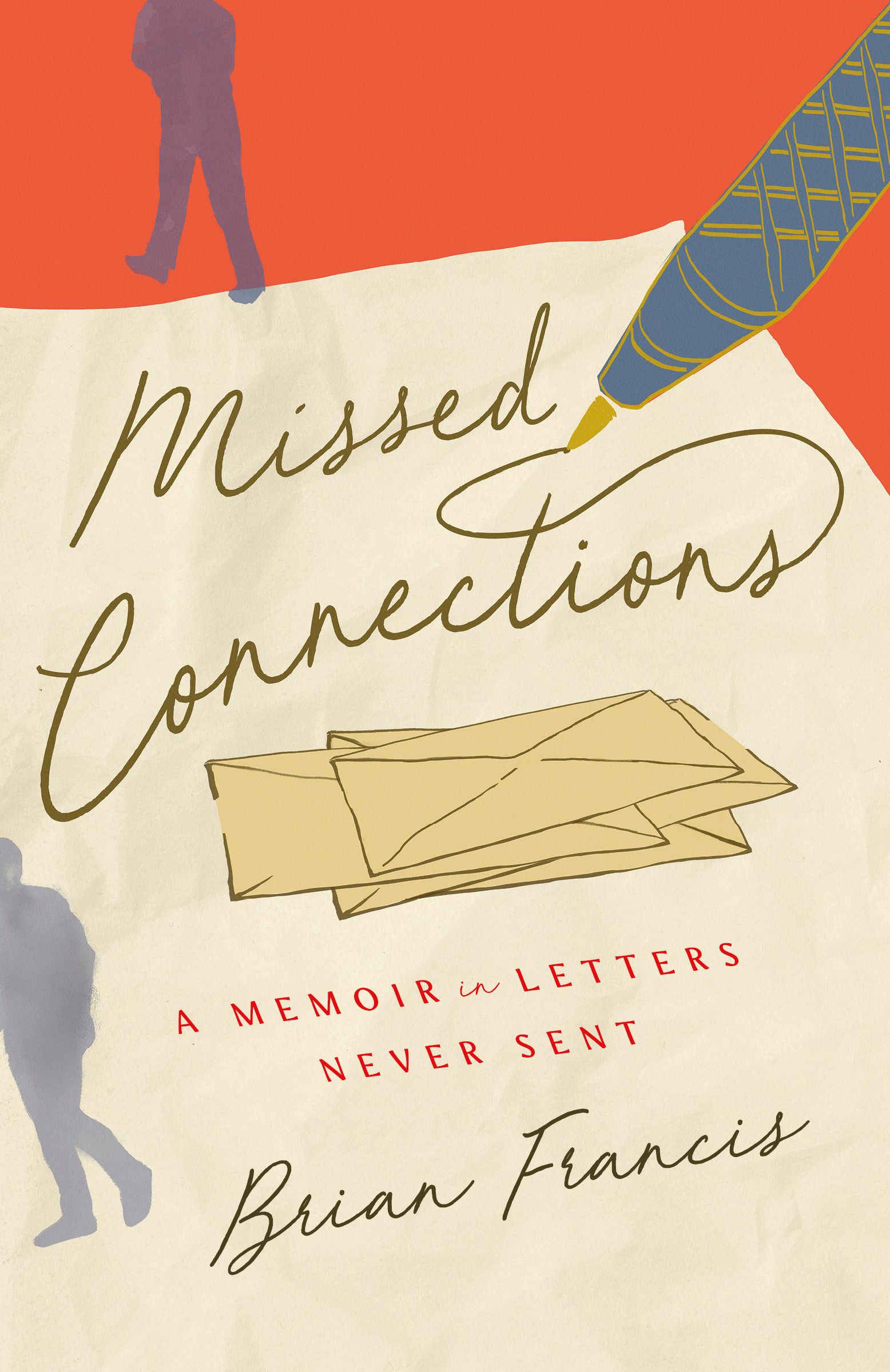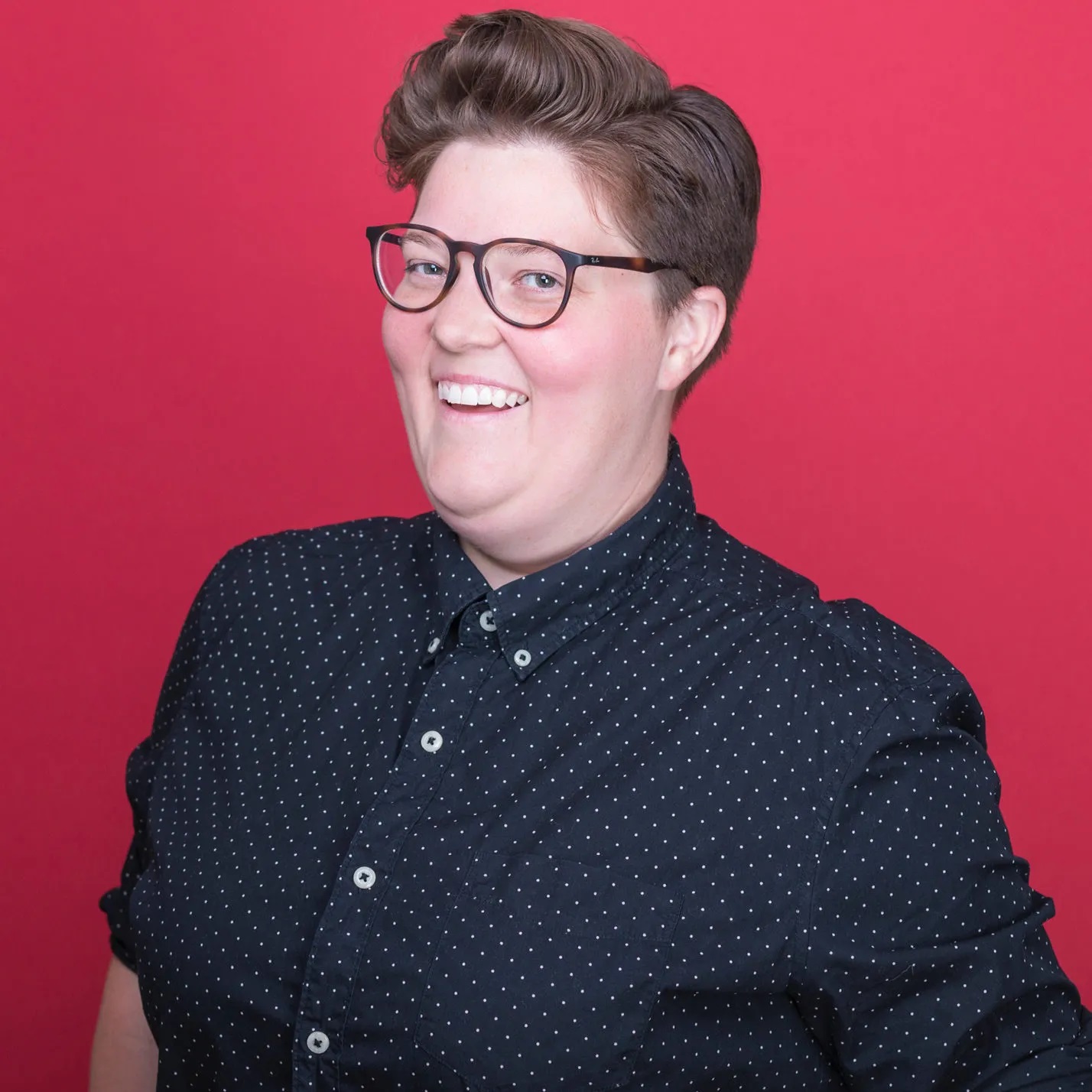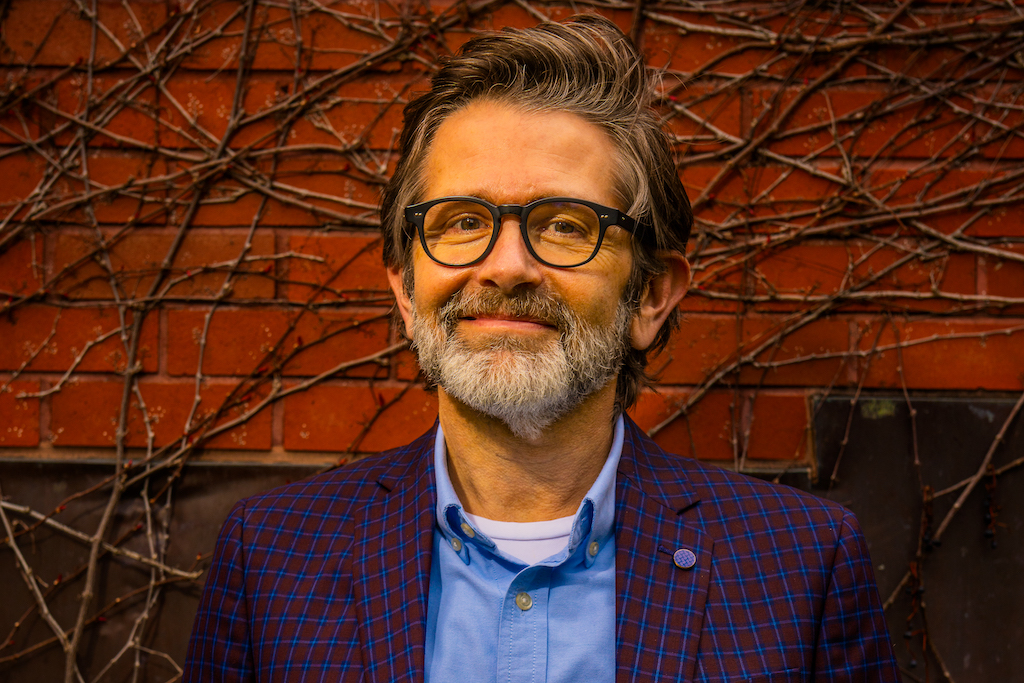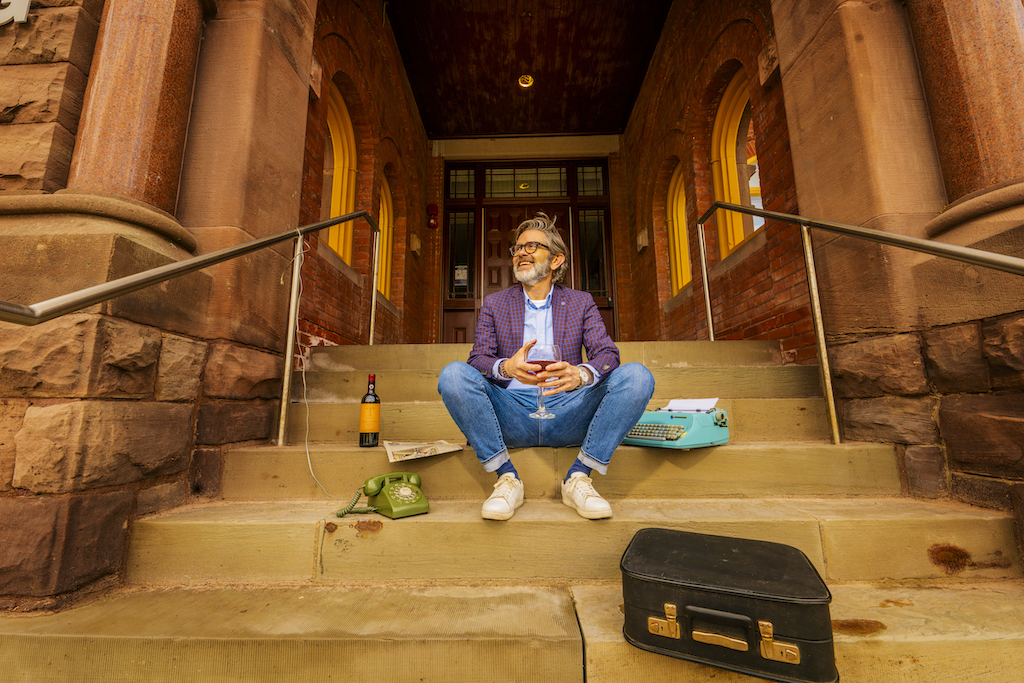A moment, please, to set up the conceit of Brian Francis’s new memoir.
In 1992, long before the internet and hookup apps became things, Francis, a closeted young man on the verge of coming out, purchased a classified ad in a newspaper looking for gay love.
Gorgeous blond hunk, 6’2”, 200 lb of solid muscle—not! Real cute university student, 21, seeks same. Tired of narcissists and tired of being alone. Princess Di and Rambo wannabes need not apply.
Francis received 25 replies by mail, responded to some and marked 13 rejected letters with an “x.” For 25 years, he paid those discards no attention. He became a writer, rising to national attention in 2004 with his debut novel, the coming-of-age hit Fruit, followed by Natural Order, which explored the relationship between gay men and their moms, and 2019’s young adult novel Break in Case of Emergency.

Somewhere along the way, he decided to look inside the envelopes with the rejected letters again. He wrote a play about the letters, and again revisits the 13 rejects in his new book, Missed Connections: A Memoir in Letters Never Sent. In witty and heartfelt essays, he replies to each (plus one letter to his younger self) exploring topics ranging from dating and casual sex to body issues, family, Pride and white privilege.
To letter-writer Sam, who wrote, “I’m told I’m a good dresser, too. I also model part-time,” Francis answers: “Based on the photos you included with your letter, I think it’s safe to assume your modelling career never took flight.” But after the jab, Francis uses his the rest of his response to Sam as a means to explore how gay men are stereotyped, recounting how, at age 10, he asked his dad about sex.
“I don’t recall much of what my dad said to me that day, but one sentence stood out. ‘There are homosexuals in the world,’ he said. ‘And they do perverted things, like lick and suck one another,’” Francis writes. “Did I know I was homosexual at ten years old? Likely not. But I would have had some understanding of my difference and a sense of recognition at the words my dad said… I don’t want to paint an unfair picture of my dad….He never pushed me into sports. Or made remarks when my weight began to balloon. He never made me feel like I had to be something I wasn’t. And this, ironically, made me feel worse about my difference.”
Xtra asked comedian Tricia Black, who knows a few things about dating and coming out, to sit down with Francis to talk about the book and some of its themes.
Out of the gate, Black, who is a millennial, boasts that she wasn’t completely befuddled by the idea of placing a personal ad in a newspaper, getting written responses, then sending letters back to people or maybe leaving messages on telephone answering machines or telling them to meet in a certain location at a certain time, just to get a date.

Tricia Black: I’m going to be 35, so I understand what personal ads are. I do. I know that they were often used quite a lot. I understand the concept, and I kind of like it. I don’t know if I could ever do it because I think I would be constantly afraid that the person was going to murder me. I would always be like: “They sound too great, but I’d have to meet them in a very public place.”
Brian Francis: But it’s really not that different from the apps and the internet. It’s a different form of communication, but technically you’re still meeting a stranger, with whatever safety precautions you’re taking. Maybe it’s the way that the handwriting is in the letter that might be more of a tip off. If it’s blood red, you might want to stay away. If there’s a sprinkling of hairs in the letter: “I don’t know what that’s all about, but I’m not going to meet you for coffee.”
Black: Would you do an exchange of letters a couple of times just to get a better feel for the person? Or would you just want to meet right away?
Francis: The premise was that you would meet them right away. So they would include their contact information, their phone number or their address. You would then reach out if you were interested so you could meet.
Black: I think my favourite letter in the book was the guy who gave you a secret code so you could put your number in the paper and only he’d know your number and could call you. That’s fun. “Are you the Zodiac Killer or just some really clever person?”
“I’m going to spend all my money on this ad because this is what I want.”
Francis: The originality of some of it was really charming. You were basically writing a letter to a stranger and you had no idea who was on the other end or how you would describe yourself in the letter and not sound kind of cliché: romantic walks on the beach or moonlight strolls. You also ran the risk that you might know the other person or the other person might know you.
Black: I also love that you were just like: “I’m going to spend all my money on this ad because this is what I want.” At least now, apps like Tinder and Bumble are pretty much free. You were being vulnerable and also putting cash on it.
Francis: Sixty-five dollars. And $65 could buy a lot of things in 1992. You could probably buy a new car for $65 in 1992 or at least get your Caesar haircut trimmed—which is the one thing from the ’90s that I just hope never comes back.
Black: How much do you think dating has changed now? You write a lot about the bar scene, and now I feel like a lot of gay bars are disappearing slowly.
Francis: In some ways, maybe, dating hasn’t changed. Maybe there’s an opportunity to be more dismissive of people now with “swipe right” or “swipe left.” When you had to write a letter, the letter was revealing of your personality. There was a sense of intimacy to that.
Black: Thinking of going back and reading these letters you never replied to, I have so many things from my past that I haven’t looked at in years—love notes, diary notes. What was it like going back to these letters that you originally put an “x” on, thinking at the time, “No, I don’t think I want to meet these people”?
“As I get older, I have a hard time connecting to myself at 21.”
Francis: It takes you back to who you were at a certain point in your life. As I get older, I have a hard time connecting to myself at 21. I look at pictures of myself at that time and I know who that person was, but at the same time, not 100 percent. I look at pictures of myself when I was in grade school and think, “What was going through my head?” Certainly what was poignant and bittersweet about those letters was me coming out; that moment of emergence and the world cracked right open for me, and me going in pursuit of something and really feeling open and willing to explore that. Because for so long, it had been something that I was just terrified of after years of feeling not connected to anybody. But it’s not like you walk through the doors of the town watering hole or the bar or whatever, and it’s a chorus of angels singing: “Welcome to the heavenly place.”
Black: Yeah, with roller skates, people dancing the can-can and nonstop liquor being passed around. What a great time that would be!
Francis: It would be nice if that existed. It absolutely doesn’t exist. Sometimes as queer people, we don’t always stop to think about the journey that we’ve been on and where we are today versus where we were 10, 15 years ago. Growing up in the 1970s was just such a time of darkness for me, and now here I am, married, living out in the open, in a pretty good place. I feel very fortunate, in a weird way, that I went through the bad stuff so I can sort of appreciate where I am today.
“You can’t shake all of that bullshit that you grew up hearing and walk away from it unscathed.”
Black: Reading this book brought me back to my coming out and how long that took me. I related to so many of the things that you wrote; it was wild to read. I’m wondering, looking back on reading those letters, would there be one or two people now that you’d actually go and meet?
Francis: Maybe. You never know how things would have worked out. At 21, what did I know about love? What did I know about relationships? Like, nothing. I knew nothing about anything. Sometimes the way that you picture things is not the reality of them. You being a comedian, if you were to tell your younger self that at one point this would be your career, not to say that it’s not fulfilling, but it’s probably different than the way that you imagined it to be. It’s not necessarily this kind of romantic, nonstop, glamorous lifestyle with you riding around in limousines, hobnobbing with celebrities and whatnot. But maybe you are. I don’t know.
Black: In my mind. It’s all up there.
Francis: When you sit down to really think about your life, you start to connect the dots and you start to understand yourself. I realized I’m still carrying some of the baggage left over from my childhood. I don’t know that I will ever get rid of that baggage. You can’t shake all of that bullshit that you grew up hearing and walk away from it unscathed. I don’t think that is a reality for many people. You kind of learn how to deal with it. I always just assume that people, when they find out I’m gay, won’t like me. It’s just a thing that has been ingrained. We went to Ireland a couple of years back and we were on a bus trip and we were the only gay couple on the bus. Now, there were a bunch of Americans on the bus, and with Americans, you just never know. I remember walking down the bus aisle and I just felt uncomfortable because I didn’t know what people were thinking of the gay couple on the bus. I’m always questioning or second guessing my own perceptions of how people see me.
“I was walking down the street with my girlfriend a couple months ago and a guy did a double-take when he passed us.”
Black: I can completely relate to that. I was walking down the street with my girlfriend a couple months ago and a guy did a double-take when he passed us. I was, like, “Oh, here we go.” You gear yourself up for something to come. Then he was, like, “I saw you in a show at Second City!” And I was like, Oh, thank God. That’s always at the back of your brain. But we’re also lucky. I feel lucky that I am privileged by my whiteness and everything. But then there’s this feeling that people, especially men, are out to get me—though I know it’s not true. The final letter in the book is to your younger self. Was it therapeutic to write that?
Francis: Yeah, the letter to myself felt good, to be able to say, “You got through it, don’t doubt yourself.” But of course, it’s also superficial because that kid never learned how his life turned out.
Black: But it’s still beautiful. I feel like we all want to be able to go back to that younger version of ourselves and tell ourselves that it’s all going to be okay.
Francis: They always do that thing on RuPaul’s Drag Race where they hold up a picture of the drag queen as a child and ask, “What would you say to eight-year-old you?” I’m always bawling at that.
Black: The other thing I love in the book is that you have a lot of empathy for your parents. I feel that way, too, about forgiving them for saying the wrong things just because they didn’t really know any better. Reading about your dad marching for PFLAG and everything, it’s just such a wonderful idea that people can grow and change.

Credit: James Heaslip
Francis: Thank you. When you think about ignorance, there’s willful ignorance and then there’s the ignorance where you can eventually admit you were wrong. It’s easier to forgive somebody if they have hurt you or if they’ve said things in the past if they didn’t know any better at the time, when they have come to understand their mistakes.
Black: Your first book, Fruit, was based a little bit on your life growing up in Sarnia, Ontario—your weight issues and things like that you experienced as a kid. Was there a difference using your life experience to write fiction compared to writing this memoir?
Francis: When you’re writing under the pretext of fiction, the writer is usually the only one who knows the truth between fiction and non-fiction. This book made me feel a lot more vulnerable because there isn’t that screen of fiction in front of it. This is me saying this was my experience growing up. I don’t know if I’m going to read any reviews of this one, because it feels like if I read a negative review, it’s about me. And that’s the difference with the memoir: [reviewers aren’t] talking about your character development or your dialogue or the plot, they’re talking about how you see your world and how you’ve shaped your own life.
“What am I going to do? The first thing is grabbing my mom’s Sears dress and putting it on and prancing around the house.”
Black: One story in the book I can completely relate to is when you write about dressing up and lip-syncing when no one’s home, but you’re constantly on the lookout: “Is someone coming through the door?” I used to do that, too, but I would pretend to be a member of the Backstreet Boys or something. By putting on your mom’s clothing, you were like, “That’s what men desire, that feminine energy.” I was like, “Women desire that masculine energy, so I’m going to write myself into this Seventh Heaven episode.”
Francis: Yes, being alone in the house at 13 or 14, those first few moments when there’s this crazy: “What am I going to do? The first thing is grabbing my mom’s Sears dress and putting it on and prancing around the house.” Drapes are drawn….
Black: … Doors are locked. You’ve got trip wires.
Francis: And you can imagine the neighbours: “I see that Francis kid is up to it again, prancing around in his mother’s dress, lip-syncing to Paula Abdul.”
Black: “She’s got her hat on backwards, and she’s got her pants down past her butt.” Every once in a while, my mom would walk in and I’d have to throw my Discman across the room and pretend I was just sitting there.
“If I was popular, if I was well liked, I would be happy.”
Francis: At that age, you really want people to admire you. If you could get people to like you and be popular, then that was the Holy Grail. “If I was popular, if I was well liked, I would be happy.” But, of course, that power dynamic had already existed for so long, not just for my generation.
Black: You write about your nephew in the book, who is younger. Do you see a difference in him and the way he operates in the world?
Francis: It is surprising to me that there is still this common ground between the generations; for a lot of queer kids growing up, there’s just a sense of displacement. But still, we’ll be driving home talking about RuPaul. When my nephew came out, it was a big deal for him to come out, for sure. But for the rest of the family, they were like: “Oh yeah.” I had come out before him and gone through all the conversations about who was to blame and who was not to blame. It was nice to see some of that groundwork that I had laid help him. And I think that’s the lasting legacy of the older generations—hopefully the work that we put in makes it easier for the generation coming and the generation after that.
[An Xtra editor asks Black and Francis how each of them met their partner.]
Black: I met my partner on Bumble. I had been on and off those apps so many times because they’re just overwhelming. But then I was like, “I’m just going to go on and date people, I’m going to go on a bunch of first dates and have a great time and see what happens.” I met my girlfriend on the third or fourth one, and that was that. My profile wasn’t overly detailed, but I was trying to be charming and a little bit funny because I’m a comedian.
“I know if I did a terrible mismatch, it would come back to bite me in the ass if it went down in flames.”
Francis: I met my husband through mutual friends, which is probably one of the better ways to meet somebody, because then you’re personally recommending someone to somebody else. I would never recommend someone to a friend if I didn’t feel 100 percent certain. I know if I did a terrible mismatch, it would come back to bite me in the ass if it went down in flames.
Black: Our first date went really well. We had a really good conversation and we laughed a lot and we liked a lot of the same things. And I think it just felt right, like there was just a gut instinct that I hadn’t gotten with other people.
Francis: On our first date, there were no red flags, no warning bells. But you also have to be open to being happy, too. I have been in situations where it’s very easy to dismiss somebody: “Well, I don’t like the way that their hair is or I don’t like the way that they sneeze.” And what you’re doing is you’re creating barriers between yourself and the other person because you’re not willing to kind of take the risk or take a chance or have your heart broken or whatever. The people you’re meeting could be really quality people but you have to be open to them.
Black: Exactly!
Missed Connections: A Memoir in Letters Never Sent will be released in Canada on August 17, 2021. This interview has been edited for length and clarity.


 Why you can trust Xtra
Why you can trust Xtra


